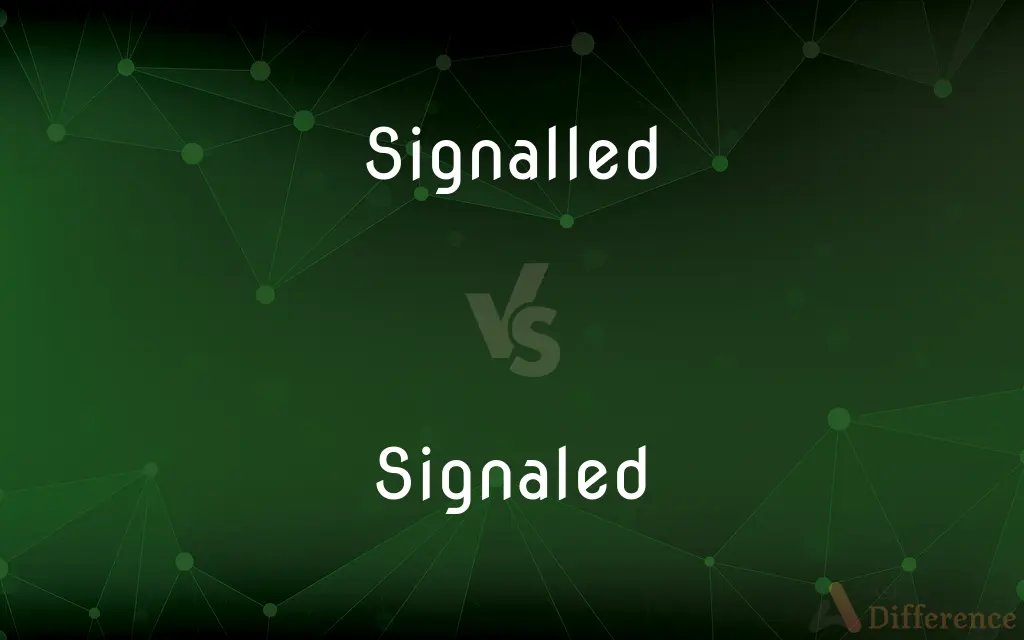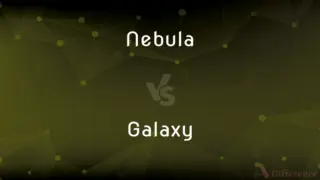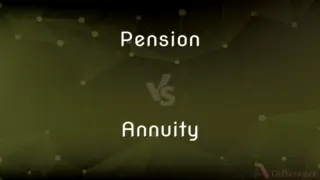Signalled vs. Signaled — What's the Difference?
By Maham Liaqat & Fiza Rafique — Updated on April 4, 2024
"Signalled" is the British English spelling for the past tense of "signal," while "Signaled" is the American English version.

Difference Between Signalled and Signaled
Table of Contents
ADVERTISEMENT
Key Differences
Signalling (with a double "l") follows the British English convention of adding an extra "l" when forming the past tense of verbs ending in a vowel plus "l," such as signalling or cancelled. On the other hand, signaled (with a single "l") adheres to the American English practice, which typically does not double the final "l" in such cases, resulting in forms like signaling or canceled.
While both "signalled" and "signaled" represent the action of making a signal or indication, the choice between them depends on the variant of English being used. Writers or speakers in the UK, Australia, and other parts of the Commonwealth are more likely to use "signalled," whereas those in the United States will prefer "signaled."
The difference in spelling does not reflect a difference in meaning or pronunciation. Both spellings convey the same action of communicating information through gestures, signs, lights, or other means, and they sound identical when spoken.
This distinction is part of a broader pattern of spelling differences between British and American English, which also includes words like "favour" vs. "favor" and "colour" vs. "color." Understanding these differences is crucial for maintaining consistency in writing and ensuring that it adheres to the conventions of the intended audience's form of English.
In digital communication and global contexts, the prevalence of both forms has led to increased familiarity among non-native speakers and writers with both British and American spellings. However, the choice of spelling can still signify the writer's cultural or linguistic background or the intended audience's preferences.
ADVERTISEMENT
Comparison Chart
Spelling
British English
American English
Example
"He signalled for help."
"He signaled for help."
Usage
Preferred in the UK, Australia, and the Commonwealth
Preferred in the United States
Meaning
Making a gesture, action, or sound to convey information or instructions
Same as "signalled"
Pronunciation
Same for both spellings
Same as "signalled"
Compare with Definitions
Signalled
Used in contexts requiring British English spelling standards.
In her essay for the UK university, she consistently used signalled.
Signaled
Past tense of signal in American English.
He signaled the end of the meeting with a nod.
Signalled
Made a gesture or signal to convey a message.
She signalled to her friend across the crowded room.
Signaled
Indicated a decision or change.
The market signaled a downturn with falling stock prices.
Signalled
Activated a signaling device.
He quickly signalled the alarm to alert the authorities.
Signaled
Made a sign or gesture to communicate something.
The quarterback signaled the next play to his teammates.
Signalled
Past tense of signal in British English.
The train signalled its arrival with a loud whistle.
Signaled
Used a device to send a signal.
She signaled for assistance using the emergency beacon.
Signalled
Indicated a course of action or intention.
The CEO signalled a new direction for the company.
Signaled
Adheres to American English spelling conventions.
His report used signaled, following American spelling rules.
Signalled
An indicator, such as a gesture or colored light, that serves as a means of communication.
Signaled
An indicator, such as a gesture or colored light, that serves as a means of communication.
Signalled
A message communicated by such means.
Signaled
A message communicated by such means.
Signalled
Something that incites action
The peace treaty was the signal for celebration.
Signaled
Something that incites action
The peace treaty was the signal for celebration.
Signalled
(Biology) A physical entity, such as a chemical or an electromagnetic wave, that activates a cell receptor and elicits a specific response.
Signaled
(Biology) A physical entity, such as a chemical or an electromagnetic wave, that activates a cell receptor and elicits a specific response.
Signalled
(Electronics) An impulse or fluctuating quantity, as of electrical voltage or light intensity, whose variations represent coded information.
Signaled
(Electronics) An impulse or fluctuating quantity, as of electrical voltage or light intensity, whose variations represent coded information.
Signalled
(Computers) A sequence of digital values whose variations represent coded information.
Signaled
(Computers) A sequence of digital values whose variations represent coded information.
Signalled
The sound, image, or message transmitted or received by means of telecommunications.
Signaled
The sound, image, or message transmitted or received by means of telecommunications.
Signalled
Notably out of the ordinary
A signal feat.
A signal event.
Signaled
Notably out of the ordinary
A signal feat.
A signal event.
Signalled
To make a signal to
I signaled the driver to proceed.
Signaled
To make a signal to
I signaled the driver to proceed.
Signalled
To relate or make known by signals
They have signaled their willingness to negotiate.
Signaled
To relate or make known by signals
They have signaled their willingness to negotiate.
Signalled
To cause an effect in (a cell) by the activation of a receptor, as by a neurotransmitter or hormone.
Signaled
To cause an effect in (a cell) by the activation of a receptor, as by a neurotransmitter or hormone.
Signalled
To make a signal or signals.
Signaled
To make a signal or signals.
Signalled
Simple past tense and past participle of signal
Signaled
Simple past tense and past participle of signal
Common Curiosities
What is the main difference between "signalled" and "signaled"?
The main difference is spelling; "signalled" is British English, while "signaled" is American English.
Are there other words with similar British and American spelling differences?
Yes, many words have similar variations, such as "labelled" (British) vs. "labeled" (American) and "travelled" (British) vs. "traveled" (American).
Do English speakers outside the US and UK prefer one spelling over the other?
English speakers in countries like Canada, Australia, and India might prefer British spellings, but this can vary widely.
Will using the wrong spelling affect my writing's reception?
In formal and academic contexts, consistent use of British or American spelling standards is important and expected.
Does the difference in spelling affect pronunciation?
No, the pronunciation of "signalled" and "signaled" is the same.
Can "signalled" and "signaled" be used interchangeably?
While they can be understood interchangeably, the choice between them should be consistent with the form of English being used.
Is one spelling more correct than the other?
No, both spellings are correct within their respective versions of English.
In digital communication, is it important to adhere to one spelling standard?
In informal digital communication, strict adherence is less critical, but in formal contexts, consistency remains important.
Can using British English in an American context (or vice versa) lead to confusion?
It might cause minor confusion or signal to readers your linguistic background, but it generally won't impede understanding.
Why do British English and American English have different spellings for the same word?
These differences arose from historical spelling conventions and standardization processes that varied between the UK and the US.
Is the meaning of "signal" in both forms exactly the same?
Yes, regardless of spelling, "signal" in both forms carries the same meaning.
How can I remember which spelling to use?
Remember the broader spelling patterns: British English often doubles the final "l" in verbs before adding a suffix, whereas American English does not.
Why is understanding these differences important?
Understanding spelling differences is key to effective communication, especially in international or formal written contexts.
Has globalization affected the prevalence of one spelling over the other?
Globalization and digital communication have increased exposure to both forms, but haven't necessarily made one form more prevalent than the other.
How do automated spell checkers handle these differences?
Most spell checkers can be set to either British or American English to help ensure consistency in spelling.
Share Your Discovery

Previous Comparison
Nebula vs. Galaxy
Next Comparison
Pension vs. AnnuityAuthor Spotlight
Written by
Maham LiaqatCo-written by
Fiza RafiqueFiza Rafique is a skilled content writer at AskDifference.com, where she meticulously refines and enhances written pieces. Drawing from her vast editorial expertise, Fiza ensures clarity, accuracy, and precision in every article. Passionate about language, she continually seeks to elevate the quality of content for readers worldwide.














































